Ons Jabeur: History-making Wimbledon finalist inspiring all of Africa
- Published
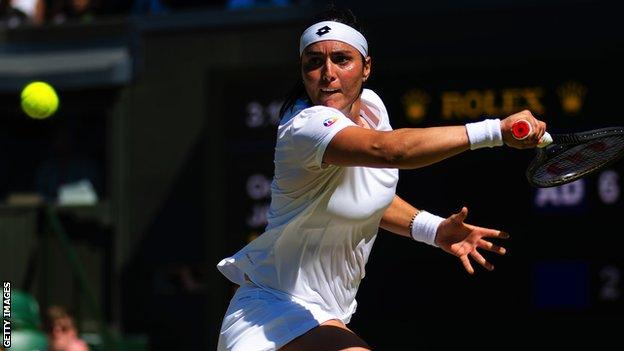
Ons Jabeur rose to number two in the world at the start of Wimbledon
Wimbledon 2022 on the BBC |
|---|
Venue: All England Club Dates: 27 June-10 July |
Coverage: Live across BBC TV, radio and online with extensive coverage on BBC iPlayer, Red Button, Connected TVs and mobile app. |
Ons Jabeur's run to the Wimbledon final is expected to inspire a new generation of African tennis players, says the continent's head of the sport.
The 27-year-old Tunisian has become the first African or Arab woman to reach a Grand Slam final in the Open era, and will face 17th seed Elena Rybakina of Kazakhstan on Saturday.
Jabeur has had a stellar rise over the past year, having moved up to number two in the WTA rankings to make her the highest-ever ranked African singles player (male or female).
"All of us in African tennis are very excited to see the results of Ons Jabeur," Hichem Riani, the chief executive of the Confederation of African Tennis, told BBC Sport Africa.
"Ons is actually a social phenomenon in Tunisia. Everybody's talking about her and she has a lot of confidence now.
"We all belong to one continent, and we are excited because it's amazing to see her on this stage. Africa is the future of tennis, of sports, of everything."
Jabeur, the third seed at Wimbledon, is well aware of being a trailblazer for players across the continent.
"I'm a proud Tunisian woman and I know in Tunisia they are going crazy right now," she said after her semi-final win over Tatjana Maria on Thursday.
"I try to inspire as much as I can and I want to see more Arab and African players on the tour."
Jabeur has won three career singles titles - including in Madrid and Berlin this year - and Cara Black, a 10-time Grand Slam champion across women's and mixed doubles, has backed her to deal with the added pressure her success has brought.
"[With] all the experience she's been accumulating over the last few months - and couple of years - I think she's really grown in that aspect," Zimbabwean Black told the BBC World Service.
"She's got better belief in herself and I think that working with a psychologist has made that big difference.
"Africa is known as the continent with not as much opportunity as the rest of the world, but I think the opportunities are there. You have just got to look for them, seek them and try to take them when you can."
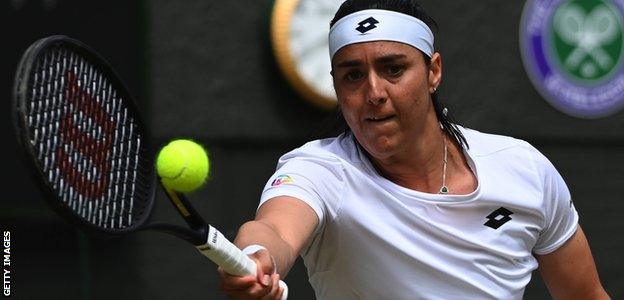
Jabeur has a 2-1 head-to-head record against Elena Rybakina, with their most recent meeting in Chicago last year
The next step, of course, is for Africa to have a women's singles Grand Slam champion - something Jabeur has turned from a distant hope to a distinct possibility.
"To have one African winner of a Grand Slam tournament is a dream [which is] becoming step by step a reality," Riani, a former Davis Cup player for Tunisia, added.
Saturday's final will fall on the first day of Eid al-Adha, an important part of the Islamic calendar known as the 'festival of sacrifice'.
"If I make it on that special holiday, one of my favourite actually, it's going to be great," Jabeur said.
The Tunisian now stands on the brink of history, after becoming the first African woman to reach a major final since South Africa's Sandra Reynolds at Wimbledon in 1960.
Making her nation and continent proud
A quarter-finalist at last year's Wimbledon and at the Australian Open in 2020, Jabeur has her country and continent solidly behind her in her quest for success.
The Tunisian ambassador to the United Kingdom, Nabil Ben Khedher, has watched Jabeur's progress to the final in SW19 this week, which he declared as "history in the making".
"She's a role-model for young Africans and young Arabs and she's a proud Tunisian," Ben Khedher told BBC Sport Africa.
"We love her so much and we want to see her winning the tournament. We knew the potential of Ons, that one day she would make it into a Grand Slam final.
"She knows she's doing something great for her country, for the African continent and for the Arab world. She's responsible and very likable and loved by so many, even outside Tunisia."
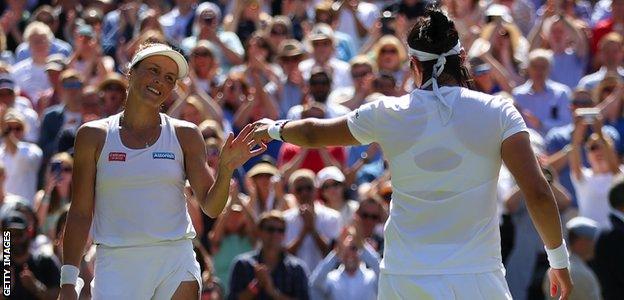
Jabeur made sure that mother-of-two Tatjana Maria got recognition from the Wimbledon crowd for her feats
Jabeur's humility has been plain to see in her run to the final, not least in taking Maria back into court to take the applause of the Centre Court crowd following their semi-final match.
Her performances also led to an "unbelievable" experience of playing doubles with the legendary Serena Williams.
Jabeur has already invited the American to her home country, an act that has not gone unnoticed in the North African nation.
"Seeing her play with such a legend like Serena, boosted her morale. It's another indication that Ons is liked and appreciated," Ben Khedher said.
"She's got millions of fans in Tunisia, and they'll be following her matches. You go on her Facebook page and you see so many comments from Tunisia. It will be a great day if she wins Wimbledon."
'Ons in a billion'
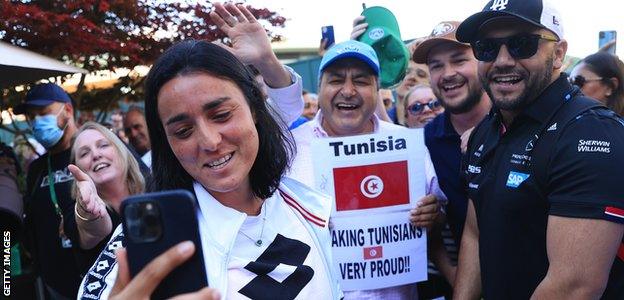
Many Tunisians have been at Wimbledon to support Jabeur, including Salim Belhaj (wearing blue cap)
Although Jabeur's style of play has attracted many fans, her most passionate supporters are from her homeland.
Salim Belhaj is a Tunisian who has lived in the UK for the past 30 years, and has only missed one of her matches over the fortnight at Wimbledon.
"She's making history for the whole of the Arab world and for the whole of Africa," he said. "I feel like I'm in a dream and I don't want to wake up from it."
Belhaj has carried several home-made posters, including signs saying 'Making Tunisians very proud!' and 'Ons in a billion'.
"That's my creation because African nations, all together, they come to 1.2 billion people," he said.
"She's a proud African, a proud Tunisian, a proud Arab. One in a billion she is, so I said 'Ons in a billion'."
Belhaj believes Jabeur has almost single-handedly brought tennis into the mainstream in Tunisia, where her matches are shown live in neighbourhood coffee shops across the country.
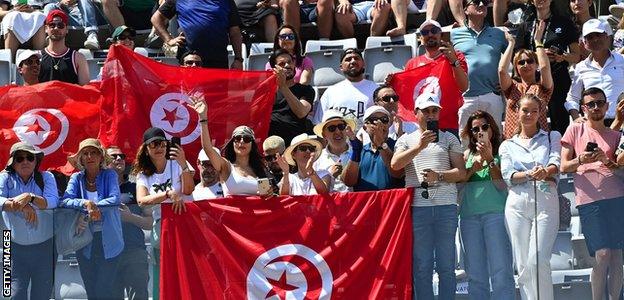
Tunisians have backed Ons Jabeur at recent tournaments in Europe, including the Italian Open in May
"In Tunisia, a year or two years ago, you did not hear about people watching tennis in a coffee shop," he said.
"A coffee shop in Tunisia is like the pub in the UK and over there, it's just football, football, football.
"If people watch Ons in Tunisia in the coffee shops, obviously it is a big inspiration for the whole nation and hopefully for the whole continent. We're going to see more like tennis courts. We're going to see more people getting involved in centres."
"She is a big inspiration to Arab women," Salim's daughter Sofia added. "It will go crazy in Tunisia if she wins.
"She's an inspiration to young girls and anyone who wants to play tennis and thinks they can't."
The army of Ons fans, whether in Tunisia, Africa or elsewhere, will find out on Saturday afternoon whether their hero can serve up an ace finish to her remarkable Wimbledon.